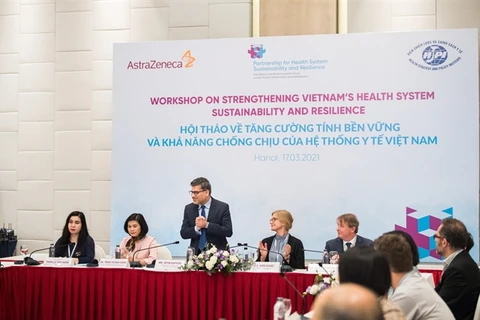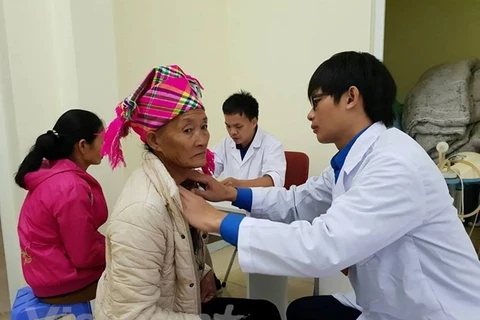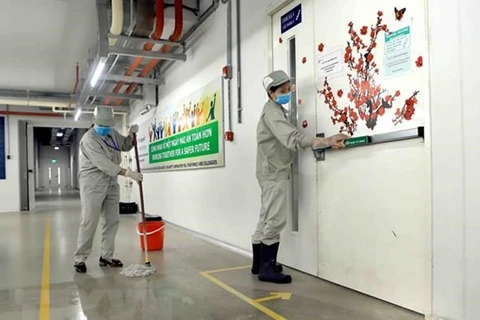 Dr Tran Thi Mai Oanh, director of the HSPI, speaking at the Healthcare System Resilience Summit (Photo: VNA)
Dr Tran Thi Mai Oanh, director of the HSPI, speaking at the Healthcare System Resilience Summit (Photo: VNA) Hanoi (VNA) – Vietnamese health experts joined former world leaders, current health ministers across the world, and business leaders on January 30 in an appeal for the adoption of a global assessment framework to strengthen healthcare system resilience in the face of future crises.
Dr Tran Thi Mai Oanh, director of the Health Strategy and Policy Institute (HSPI) under the Vietnamese Ministry of Health, attended and delivered a speech at the expert forum within the framework of the Healthcare System Resilience Summit, held by AstraZeneca at the ongoing EXPO 2020 Dubai.
This framework, along with the event, is part of the Partnership for Health System Sustainability and Resilience (PHSSR) – a programme that has been implemented in Vietnam since 2020 through cooperation between the HSPI and AstraZeneca.
At the summit, Oanh shared Vietnam’s valuable experience in building and developing an extensive grassroots healthcare network with more than 11,000 ward and commune health facilities which played a vital role in the early detection, effective monitoring, and control of COVID-19, as well as the rapid vaccination for the community.
“Having recorded these successes, yet Vietnam’s healthcare system has still been acutely affected by COVID-19, as well as existing burdens from non-communicable diseases. The implementation of the PHSSR framework has helped us identify areas where further investments and innovations are needed to holistically develop a more resilient and sustainable health system. At the same time, we are also keen to support a wider adoption of the framework as a global mechanism for crisis preparedness,” she added.
Nitin Kapoor, Chairman and General Director at AstraZeneca Vietnam and Asia Area Frontier Markets, said the summit comes at a crucial point for global health systems which remain under enormous pressure almost two years on from the start of the pandemic.
According to him, experts are right to recommend that pandemic control must come first, but that it needs to be followed by comprehensive modernisation and reforms in the healthcare system. He also expressed his hope that the experience gained from the effective adoption of the PHSSR framework in Vietnam will be helpful to other countries.
The event also attracted other speakers, including Lena Hallengren, Minister of Health and Social Affairs of Sweden; Jose Manuel Barroso, chair of GAVI, the Vaccine Alliance and former President of the European Commission; Malcolm Turnbull, former Australian Prime Minister; Prof. Ahmed Aljeadi, Deputy Minister of Health of Saudi Arabia; and Borge Brende, former Norwegian Minister of Foreign Affairs and President of the World Economic Forum.
The PHSSR framework, devised by the London School of Economics, has laid the groundwork to boost innovation across five key domains – governance, funding, workforce, medicines and technology, and service delivery – to render health systems more resilient.
PHSSR’s mission is to help build health systems that are both resilient to crises and sustainable in the face of long-term stress. It does this by providing tools and resources for research, a focal point for collaboration and knowledge exchange within and between countries, and a platform to disseminate and catalyse the adoption of breakthrough insights.
The framework was run as a pilot in Vietnam and seven other countries - the UK, France, Germany, Italy, Poland, Spain, and Russia - assessing their health systems against the framework criteria. An action plan was then established for each country with a series of steps for health leaders and policymakers to strengthen systems against future crises. In 2022, the framework will run in 12 more countries.
With a history spanning 170 years, the World Expo is among the world’s oldest and largest events, only after the Olympic Games and FIFA World Cup. It has provided a platform to showcase the greatest innovations that have shaped the world today. Expo 2020 will continue this tradition by showcasing the latest technology from around the globe.
The Expo 2020 Dubai will run until March 31, 2022, attracting more than 190 countries and international organisations. It is expected to welcome 25 million visitors./.






















